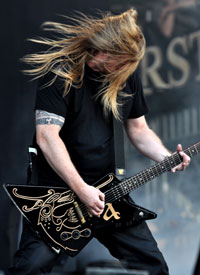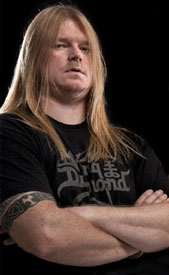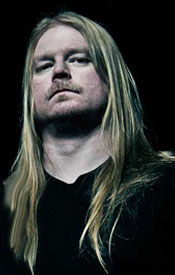|
Interview conducted March 18 2016 Interview published March 26 2016 |
"Sometimes you're overpaid and sometimes you're underpaid, but the difference is that we know when we're overpaid."
Metal Covenant met up with Olavi Mikkonen of melodic death metallers Amon Amarth in a bar in Stockholm just prior to the listening party for the new record Jomsviking [Street date: March 25th]. Although it's sometimes difficult to get it on print, Olavi is indeed a positive fellow and not someone who always answers by the book and quite often he takes his time to figure out his answers before giving them.
"Even if Johan perhaps would want to sing about something else, I don't know if the rest of us would accept it."
![]()
Tobbe: Besides from being a concept album, why isn't this really just another standard Amon Amarth record? Or maybe that's just what it is?
Olavi: Well, of course it's a standard Amon Amarth record, but I think, for the fans, the concept is what they see. But our way of working has been different. We looked at it more as a film project, like we were doing a film. Johan [Hegg, vocals] had a full script that we broke down into sections that became the songs. Then we kind of pieced together stuff in its right place and since we couldn't change the tracklist or the story, we had to find the right mood in the music to make it fit.
We have really been bouncing stuff and I would say that this is the record on which we have been brainstorming the most so far. You know, bouncing ideas the most, been into discussions, been jamming, having a few beers together and trying things out.
Tobbe: On your last record [Deceiver Of The Gods] you took a little step closer to heavy metal, and regarding this subject, with the new album, what's new?
Olavi: I think we have moved even closer to heavy metal, I would say. And a thing that we have been working with is; we have always had melodies and there has always been twin guitars, but maybe the melodies have ended up being overshadowed behind all the drums and the whole sound picture, whereas we now tried to highlight the melodies to a greater extent.
An example is the chorus in At Dawn's First Light, where we in the background have a classic Amon Amarth tune with a bass tune as a third tune, but then we have an additional lead guitar that does exactly the same as what the tune does, but it kind of fronts, in a way, as support to the vocals. Since our vocals aren't melodic, like Iron Maiden's, we need something else to make the melody. Our mindset has been like this with quite a few songs, to bring forth the melodies in a different way, and this is something we haven't done before.
Tobbe: A new drummer, so to speak, even though he's not an official member of the band. [Tobias "Tobben" Gustafsson, session drummer] What was it like, after so many years, to have someone else to lead, or to direct, or just having involved?
Olavi: Regarding to lead and direct, I wouldn't say it was any different really. Tobben had of course completely free hands. He kind of put down his drums the way he wanted to. Nothing strange with that. I think what has been the biggest difference is that Tobben is more enthusiastic and more driven. Like "This is fun! Let's try this! Oh, this is cool! Let's do this!". More like that. I think it's been super fun and he's such a positive human being too. You know, it's been really fun and we have talked about drumming stuff and riffs and things like that with him. Everything is so positive and that's really awesome.
 Tobbe:
Without a doubt it's Amon Amarth playing on the record, so how hard is
it to not copy yourselves after this many records? Some things are to
a small extent of course similar, since bands have a certain style, but
how difficult is it to not reuse stuff already done?
Tobbe:
Without a doubt it's Amon Amarth playing on the record, so how hard is
it to not copy yourselves after this many records? Some things are to
a small extent of course similar, since bands have a certain style, but
how difficult is it to not reuse stuff already done?
Olavi: I think it's really hard. I can only speak for myself and the way I work and if I have made a specific song, I don't want to make that specific song once again. I let go of that trail and then I try to find a new trail. I really try to find a new rhythm and stuff like that. On the new record we have for example the third song, On A Sea Of Blood, which is a classic fast Amon Amarth song, but it has a whole different rhythm, and that rhythm we have never played before. I was actually kind of proud when I found that rhythm. I hope that people will hear that. But I try really.
I very much try to find new stuff. And I think with At Dawn's First Light, we have never played in that tempo and been riffing in that way, and that goes for the last song, Back On Northern Shores, as well. Raise Your Horns, we have never played in that way before.
I really try, but I know what works when we go from one key to another and with arrangements and therefore it's easy to end up in the same track or with something similar, I think. And there are certain things that I like, such as certain kinds of drum rolls and stuff like that and maybe there are too many repeats. I don't know, but I try to think about it.
Tobbe: How much could you, hypothetically, compromise with your style of music without ruining your natural performance?
Olavi: I don't know, but we often tend to joke a little bit about "It doesn't really matter what we do. In the end it will sound like Amon Amarth anyway.". And another thing, that people maybe don't think of, is that we have had the same tuning on the guitar ever since The Avenger [1999], so if we should suddenly just change a little bit there, we would have a completely different sound picture. It would be an easy way to renew our sound.
Tobbe: Amon Amarth obviously plays really heavy music. For us who listen to metal all the time it isn't, you know, brutally heavy, but for a person who basically listens to rock and hard rock music it's very, very heavy. And more melodic songs and softer music often generate greater popularity. Just look at In Flames for example. So are you sometimes tempted by the thought of playing just a bit softer music to possibly generate more fans?
Olavi: Honestly, I have never even thought of it. I'm totally honest really. You know, if we were trying to become a radio rock band; there's millions of radio rock bands who can do it better than we can, so why should we do it, you know. The music that we make is the music that I want us to make. It's what I want Amon Amarth to be and it's what I like to hear. And then I can't really see ourselves without Johan's growling vocals.
 Tobbe:
What makes me think of it is that you already have melodies in the songs
that people get attached to. You know, kind of simple harmony guitar parts.
Tobbe:
What makes me think of it is that you already have melodies in the songs
that people get attached to. You know, kind of simple harmony guitar parts.
Olavi: Yes, what we do is not so difficult. The hard part of music is not the performance, but to come up with ideas. Many of the best riffs, whether it's Deep Purple or Rainbow or whoever, are actually really simple. You don't have to show off technically. But back to your question. We have never thought of it, but maybe people will believe so when they hear that it contains pretty frequent heavy metal riffing. But we still have brutal vocals, even if Johan is very articulate. Maybe he's the most articulate growl vocalist ever?
But no, I'm satisfied with what we do and it's really awesome that we have been doing this for such a long time and with the position we have there's no reason to try to become some sort of radio rock band or something like that.
Tobbe: About the lyrical content, even if I reckon that Johan has written every word of it. Why was it decided to write about Jomsvikings specifically and not just any other story about Vikings?
Olavi: We have talked about making a concept album and I think we decided pretty early on to go for it this time. We were bouncing a few different ideas and when Johan, who had given us some hints before that he had something going on, showed us what he had, he had a full story. What usually is worrying when you make a concept album is that you don't have a full story for a whole record. But when he showed us what he had, we felt that it was a full story, so that was, above all, probably why it was chosen.
And the story was cool too. Why Johan chose Jomsviking is something you have to ask him, but the actual Jomsvikings themselves are really cool. I think he started this project with the intention of trying to write a screenplay and then later it became something for Amon Amarth instead.
Tobbe: Do you think that you guys can ever distance yourselves a little bit from your lyrical content or will you go on with these few subjects until the end?
Olavi: Even if Johan perhaps would want to sing about something else, I don't know if the rest of us would accept it. [Smiles] I mean, I believe that we have already taken this so far that it would be wrong if we started to sing about the birds and the bees or whatever it may be.
I actually believe that we have locked ourselves in a little bit, but at the same time I believe that we can find different angles and maybe it doesn't always have to be about fights and conquests. Maybe we could go more spiritual and natural? We have never went that way before and it might be something that we can explore. But regarding the Viking theme, it's something that we have built up and I think it would be unwise to change, you know.
Tobbe: And what about the duet with Doro? [on A Dream That Cannot Be] Why specifically her and not just some random female singer?
Olavi: We felt that we wanted a metal chick and we thought Doro was the obvious. Simple as that, and also to still our own little fanboy maybe. Honestly. Yeah, I really think so. We all grew up listening to Warlock and I had her poster on the wall when I was little, you know. I'm really honest when I say that it's a combination of partly because she's a cool singer and a little bit because we personally are fanboys. And she's really nice and humble too. It was really amazing when she came to the studio. It was certainly the highlight for us all and for Andy Sneap [producer] too. He was just as excited as we were.
Tobbe: Regarding your videos, First Kill and At Dawn's First Light. What were your thoughts behind the themes?
Olavi: On the first one our thoughts were to have this large stage production and the director presented a story that fitted the lyrics, and we thought it was cool. The theme for the second video was something we thought up in the studio. We wanted a video where we were standing in the middle of a fight, with chaos around us. And if we were getting killed in the end or if we were gonna fight back didn't matter. We just wanted it to be chaotic. That's how we described our idea. It was really fun.
Tobbe: Before I saw the First Kill video I read that the guy's first kill was accidental, but in the video, doesn't he cut that other guy's throat from behind?
Olavi: You know, the video guy has his artistic freedom to do what he wants to. But the thing is, and I will be completely honest with you, as a band, you hire people and you show them your ideas and they make the video. You don't step in and change these small things.
 Tobbe:
Do you think that you are at the height of your popularity right now?
Tobbe:
Do you think that you are at the height of your popularity right now?
Olavi: Yes, I think so really. We have never taken giant steps. We have always went forward slowly. The whole last season went better and better and I think that this album will be our best selling album so far. Our real tour starts in April in the USA and we sell more tickets than before. So everything is getting better and it's really awesome that you can be successful even if you're getting a little bit older.
Tobbe: Whether we like it or not, most bands have a height of popularity for like 5-7 years.
Olavi: But maybe we haven't reached our top yet? [Laughs] But, you know, at the same time, like I said, for us it has come step by step, so it's not like we're sitting at home and thinking we're the next Metallica. We're in line with reality. Some bands think that they are rock stars as soon as they have released a record, you know. We stand with both feet on the ground and know how reality works. Sometimes you're overpaid and sometimes you're underpaid, but the difference is that we know when we're overpaid.
We don't believe that that's our level, whereas many bands are like "Oh yeah! That's our level now." and everything just falls apart. We're pretty much in touch with reality and we have been doing this for many years and we have taken care of the band ourselves for so many years that we know the business side of it. I think we are quite humble and take things with ease. If things go well, you have to work even harder to not ending up going backwards.
We have toured with so many bands, that were bigger than us, that suddenly started to get lazy when things went well and now those bands don't do so well anymore. It's something we talk about quite frequently, that even if things go well, we can't start to relax and it's like "Work harder! Work better! Even better records! Better live shows!".
Tobbe: What's absolutely most important for the band right now?
Olavi: I think what's most important is that the four of us stay friends, as we have been for over 20 years, and that we have great communication and that we strive towards the same goal and that we have no egos. Above all, staying friends, because I believe that that's the key to our success.
![]() See
also: review of the
album Jomsviking
See
also: review of the
album Jomsviking
Related links:
www.amonamarth.com
www.facebook.com/officialamonamarth
![]()